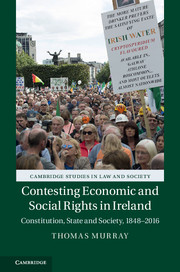Book contents
- Frontmatter
- Dedication
- Contents
- Acknowledgments
- Introduction: The Politics of Economic and Social Rights
- 1 Constitution ‘from Below’ in Ireland: 1848–1922
- 2 ‘Not Alone Personal Liberty but Economic Freedom’: Socio-economic Rights in the Making of the 1922 Irish Free State Constitution
- 3 ‘Highly Dangerous’? Socio-economic Rights in the Making of the 1937 Irish Constitution
- 4 Contesting the Irish Constitution and the World-System: 1945–2008
- 5 The Polarities of Justice and Legal Business
- 6 Contesting Property Rights
- 7 Contesting Trade Union Rights
- 8 Contesting Family, Education, andWelfare Rights
- 9 Reproducing the Value-Consensus State
- 10 Constitution ‘from Below’ in Ireland: 1945–2008
- Conclusion: Contesting Economic and Social Rights Today
- Bibliography
- Index
Introduction: The Politics of Economic and Social Rights
Published online by Cambridge University Press: 05 August 2016
- Frontmatter
- Dedication
- Contents
- Acknowledgments
- Introduction: The Politics of Economic and Social Rights
- 1 Constitution ‘from Below’ in Ireland: 1848–1922
- 2 ‘Not Alone Personal Liberty but Economic Freedom’: Socio-economic Rights in the Making of the 1922 Irish Free State Constitution
- 3 ‘Highly Dangerous’? Socio-economic Rights in the Making of the 1937 Irish Constitution
- 4 Contesting the Irish Constitution and the World-System: 1945–2008
- 5 The Polarities of Justice and Legal Business
- 6 Contesting Property Rights
- 7 Contesting Trade Union Rights
- 8 Contesting Family, Education, andWelfare Rights
- 9 Reproducing the Value-Consensus State
- 10 Constitution ‘from Below’ in Ireland: 1945–2008
- Conclusion: Contesting Economic and Social Rights Today
- Bibliography
- Index
Summary
There is no more potent tool for rupture than the reconstruction of genesis: by bringing back into view the conflicts and confrontations of the early beginnings and therefore all the discarded possibles, it retrieves the possibility that things could have been (and still could be) otherwise. And through such a practical utopia, it questions the ‘possible’ which among all others, was actualised.
– Pierre BourdieuConstitutional problems are not primarily problems of law, but of power.
– Ferdinand LasalleIRELAND'S MULTITUDES were unexpected. On 1 November 2014, more than 150,000 people filled and made lively the country's rain-drenched streets and city centres. From Dublin to Galway and Cork to Donegal, some one hundred protest groups gathered in their communities to demonstrate their opposition to Irish Water, a water-metering utility introduced after the financial crisis of 2008 as part of Ireland's bailout programme. Over the preceding year, the initial actions of community groups physically preventing the installation of water meters had grown into a countrywide celebration of civil disobedience and mass refusal to pay water charges. People had had enough. ‘Austerity has gone too far’ was the most cited reason given for protesting. Other reasons given were ‘to stop the future privatisation of water’, to abolish water charges and to oppose the ‘bank bailouts/debt’. Water, some demonstrators claimed, was ‘not for profit’ but ‘a human right’.
Certain organisations sought to give formal expression to talk of human rights on the streets. On May Day, 2015, the ‘Right2Water’ campaign announced its ‘Policy Principles for a Progressive Irish Government’. The campaign advocated the constitutional recognition of rights to water and to housing, accompanied by rights to jobs and decent work, to health, to debt justice, to education, and to democratic reform. Similarly, the previous year, the government-appointed Constitutional Convention voted by a majority of more than 80 per cent to create constitutional rights to health, housing, and adequate living standards, including those rights listed in the International Covenant for Economic, Social, and Cultural Rights (ICESCR). Both the ‘Right2Water’ campaign and the Constitutional Convention suggest wider support for socio-economic rights. According to one recent poll, more than 70 per cent of the Irish public believes that the Constitution should be amended to protect additional rights such as those to health and social security.
- Type
- Chapter
- Information
- Contesting Economic and Social Rights in IrelandConstitution, State and Society, 1848–2016, pp. 1 - 47Publisher: Cambridge University PressPrint publication year: 2016



